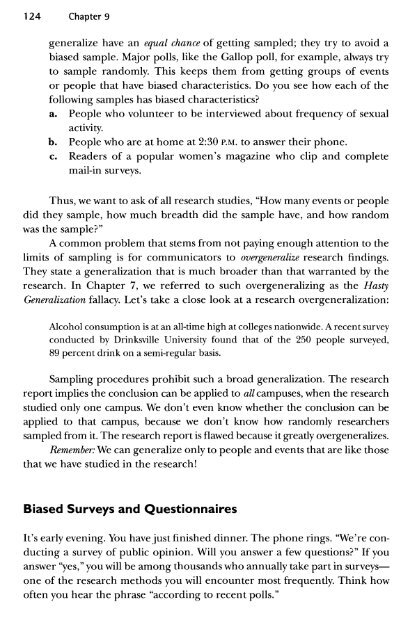Asking the Right Questions, A Guide to Critical Thinking, 8th Ed
Asking the Right Questions, A Guide to Critical Thinking, 8th Ed
Asking the Right Questions, A Guide to Critical Thinking, 8th Ed
Create successful ePaper yourself
Turn your PDF publications into a flip-book with our unique Google optimized e-Paper software.
124 Chapter 9<br />
generalize have an equal chance of getting sampled; <strong>the</strong>y try <strong>to</strong> avoid a<br />
biased sample. Major polls, like <strong>the</strong> Gallop poll, for example, always try<br />
<strong>to</strong> sample randomly. This keeps <strong>the</strong>m from getting groups of events<br />
or people that have biased characteristics. Do you see how each of <strong>the</strong><br />
following samples has biased characteristics?<br />
a. People who volunteer <strong>to</strong> be interviewed about frequency of sexual<br />
activity.<br />
b. People who are at home at 2:30 P.M. <strong>to</strong> answer <strong>the</strong>ir phone.<br />
c. Readers of a popular women's magazine who clip and complete<br />
mail-in surveys.<br />
Thus, we want <strong>to</strong> ask of all research studies, "How many events or people<br />
did <strong>the</strong>y sample, how much breadth did <strong>the</strong> sample have, and how random<br />
was <strong>the</strong> sample?"<br />
A common problem that stems from not paying enough attention <strong>to</strong> <strong>the</strong><br />
limits of sampling is for communica<strong>to</strong>rs <strong>to</strong> overgeneralize research findings.<br />
They state a generalization that is much broader than that warranted by <strong>the</strong><br />
research. In Chapter 7, we referred <strong>to</strong> such overgeneralizing as <strong>the</strong> Hasty<br />
Generalization fallacy. Let's take a close look at a research overgeneralization:<br />
Alcohol consumption is at an all-time high at colleges nationwide. A recent survey<br />
conducted by Drinksville University found that of <strong>the</strong> 250 people surveyed,<br />
89 percent drink on a semi-regular basis.<br />
Sampling procedures prohibit such a broad generalization. The research<br />
report implies <strong>the</strong> conclusion can be applied <strong>to</strong> all campuses, when <strong>the</strong> research<br />
studied only one campus. We don't even know whe<strong>the</strong>r <strong>the</strong> conclusion can be<br />
applied <strong>to</strong> that campus, because we don't know how randomly researchers<br />
sampled from it. The research report is flawed because it gready overgeneralizes.<br />
Remember: We can generalize only <strong>to</strong> people and events that are like those<br />
that we have studied in <strong>the</strong> research!<br />
Biased Surveys and Questionnaires<br />
It's early evening. You have just finished dinner. The phone rings. "We're conducting<br />
a survey of public opinion. Will you answer a few questions?" If you<br />
answer "yes," you will be among thousands who annually take part in surveys—<br />
one of <strong>the</strong> research methods you will encounter most frequently. Think how<br />
often you hear <strong>the</strong> phrase "according <strong>to</strong> recent polls."



